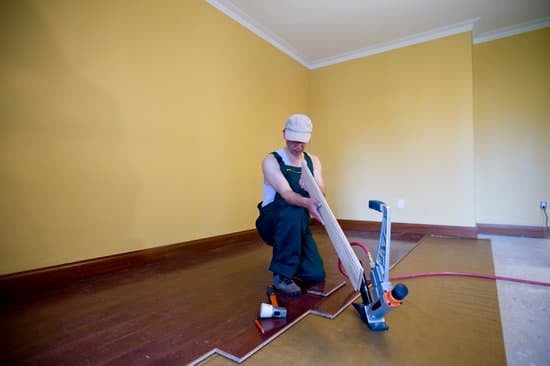Home improvement stores have become a staple in our daily lives, offering a vast array of supplies, tools, and expertise for any home renovation or repair project. Whether it’s a simple fix-it task or a major remodeling endeavor, these stores play an essential role in meeting our household needs. But amidst times of crisis or emergency, such as natural disasters or pandemics, the question arises – are home improvement stores considered essential businesses?
In order to determine whether home improvement stores should be classified as essential businesses, it is crucial to understand the definition of essential businesses during times of crisis. Essential businesses are those that provide vital goods and services necessary for the well-being and functionality of society even in times of disruption. These can include grocery stores, healthcare facilities, transportation services, and more.
During emergencies and crises like hurricanes, floods, or earthquakes, home improvement stores prove their indispensability by providing supplies and equipment crucial for mitigation efforts and post-disaster recovery. They offer everything from plywood for boarding up windows to generators for emergency power supply. By stocking these essential items and being open during crisis situations, they play a significant role in safeguarding homes and ensuring everyone has access to necessary resources.
Furthermore, home improvement stores contribute greatly to the local and national economies through their financial impact. They create jobs within communities through both on-site employment opportunities and partnerships with local suppliers. This not only boosts economic stability but also enhances skill development and career advancement prospects for residents. Additionally, the sale of construction materials generates revenue that supports municipal budgets and contributes to overall economic growth.
Definition of essential businesses
During times of crisis or emergency, the determination of what qualifies as an essential business becomes crucial. Essential businesses are those that provide goods and services that are necessary for the health, safety, and welfare of the public. They are deemed essential based on their ability to meet the basic needs of the community and maintain critical infrastructure.
When a crisis occurs, whether it be a natural disaster or a global pandemic like COVID-19, government authorities and health organizations work together to identify which businesses should be allowed to continue operating. These determinations are made based on several factors including the nature of the crisis, potential risks, and the impact on public health and safety.
Home improvement stores play a vital role during emergencies as they provide essential supplies and equipment necessary for repair, maintenance, and restoration. In times of natural disasters such as hurricanes or floods, home improvement stores become a lifeline for communities as they offer resources such as plywood for boarding up windows, generators for electricity during power outages, shovels for clearing debris, tarps for roof repairs, and many other items needed to safeguard homes.
During crises like COVID-19 lockdowns, home improvement stores have also been considered essential due to their provision of supplies necessary for maintaining safety in homes such as cleaning products and personal protective equipment.
It is important to note that while home improvement stores may fall under the category of essential businesses during emergencies, their operations may still be subject to certain restrictions imposed by government authorities. These restrictions aim to balance the need for continuity of essential services with measures to prevent the spread of disease or mitigate further damage caused by ongoing emergencies.
Home improvement stores are often required to implement safety protocols such as social distancing measures, mask requirements, limited store capacity, enhanced sanitization practices, and contactless payment options to ensure the well-being of both customers and employees.
The role of home improvement stores during emergencies
During times of natural disasters, emergencies, and crises, home improvement stores play a crucial role in providing essential supplies and equipment to the affected individuals and communities. These stores are often well-stocked with items such as generators, emergency lights, plywood, sandbags, and other necessary supplies that are in high demand during emergencies.
One of the primary reasons why home improvement stores are essential during emergencies is their ability to meet the immediate needs of homeowners for repair and maintenance materials. Many people find themselves in urgent need of items like tarps or roofing materials to cover damaged areas of their homes, plumbing supplies to fix broken pipes, or tools for clearing debris.
Home improvement stores offer a wide range of products that can help individuals quickly address these issues and make their homes safe and habitable again.
In addition to serving individual homeowners, home improvement stores also play a critical role in supporting contractors and construction workers who are responsible for repairing infrastructure damage caused by disasters or emergencies. These professionals rely on these stores to source building materials, tools, safety equipment, and other supplies needed for their repair projects. Without the availability of these resources at home improvement stores, the recovery process would be significantly hindered.
| Emergency Event | Percent Increase in Sales at Home Improvement Stores |
|---|---|
| Hurricane Harvey (2017) | 23% |
| COVID-19 Pandemic (2020) | 15% |
| Tornado Outbreak (2019) | 18% |
The data above highlights the significant increase in sales at home improvement stores during times of emergencies, emphasizing their essential role in providing essential supplies and equipment.
Overall, home improvement stores are vital during emergencies due to their ability to provide essential supplies and support both homeowners and contractors in their recovery efforts. Their accessibility to a wide range of products, expertise, and community outreach initiatives further solidify their critical role as an essential business during times of crisis or emergency.
Economic Impact
Home improvement stores play a significant role in the economic impact, making substantial financial contributions to both local and national economies. These stores have become essential businesses due to the numerous benefits they provide in terms of job creation, increased consumer spending, and growth in the construction industry.
Job Creation
One of the primary ways home improvement stores contribute to the economy is through job creation. These establishments require a large workforce to provide customer service, manage inventory, handle logistics, and offer expert advice. Home improvement stores often employ a diverse range of individuals from sales associates and cashiers to specialized technicians and managers. The employment opportunities generated by these stores not only support local communities but also contribute to overall economic stability.
Increased Consumer Spending
Home improvement stores encourage increased consumer spending by offering a wide range of products and materials for household repairs, renovations, and maintenance. When individuals undertake home improvement projects, they frequently spend money on various supplies such as tools, paint, flooring materials, appliances, and fixtures. This surge in consumer spending not only benefits the home improvement industry itself but also stimulates other sectors of the economy such as manufacturing and transportation.
Growth in Construction Industry
The presence of home improvement stores contributes to the growth of the construction industry as well. By providing readily available resources and materials under one roof, these establishments enable contractors and homeowners to complete projects efficiently. The ease of access to quality products ensures that construction projects can continue smoothly without delays or disruptions. Consequently, this contributes to increased demand for contractors’ services and creates more business opportunities for professionals within the construction industry.
Job creation
Home improvement stores play a vital role in job creation and economic stability within communities. These businesses provide employment opportunities to a wide range of individuals, including both skilled and unskilled workers. From sales representatives to cashiers, warehouse staff to delivery drivers, home improvement stores create a diverse array of jobs that contribute to the local economy.
One of the significant benefits of job creation by home improvement stores is the economic stability it brings to communities. With stable employment opportunities, individuals can support themselves and their families, contribute to the local economy through spending, and have a sense of financial security. This stability ripples out into the community, creating a positive economic impact as these employees are more likely to invest their income back into local businesses and services.
Moreover, home improvement stores often hire locally, further bolstering the economic stability of the area. By employing community members who are familiar with the needs and interests of their fellow residents, these stores can tailor their offerings and services to better serve the local population. Additionally, having job opportunities within close proximity reduces commuting times and transportation costs for employees while fostering a sense of belonging within their own neighborhoods.
To highlight this point further, here are some specific ways in which home improvement stores positively contribute to job creation:
- Providing entry-level positions that offer on-the-job training for individuals looking to gain valuable work experience.
- Creating opportunities for skilled tradespeople such as plumbers, electricians, carpenters, or painters who may find employment through contracting or supplier partnerships with these stores.
- Maintaining administrative roles such as human resources managers or store managers that require leadership skills and expertise.
Overall, home improvement stores not only provide essential supplies for homeowners but also act as significant contributors to job creation and economic stability within communities. Their presence fosters financial security for employees while benefiting local economies through increased spending and community engagement. It is clear that these stores play a crucial role in supporting both the economic and social fabric of our communities.
Accessibility to necessary resources
Home improvement stores play a crucial role in providing accessibility to necessary resources for household repairs, renovations, and maintenance. These stores offer a wide range of products and materials that are essential for homeowners and contractors alike. Whether it’s tools, building materials, or specialized equipment, home improvement stores serve as a one-stop-shop for individuals seeking to complete DIY projects or professionals working on larger-scale construction jobs.
One of the primary advantages of home improvement stores is their extensive product inventory. From screws and nails to power tools and paint supplies, these stores ensure that customers have access to the necessary resources needed for their projects. This convenience saves people valuable time and effort by eliminating the need to visit multiple locations in search of specific items.
In addition to offering a comprehensive range of products, home improvement stores also provide guidance and support to customers. Knowledgeable staff members are available to answer questions, provide recommendations, and offer expert advice on the best products and techniques for various projects. This assistance is particularly invaluable for individuals who may not have prior experience with home repairs or renovations.
Furthermore, home improvement stores often prioritize customer satisfaction by offering services such as online ordering, delivery options, and in-store pickup. These conveniences enhance accessibility by accommodating different customer preferences. By making it easier for individuals to obtain the necessary resources for their projects, home improvement stores contribute significantly to the overall success of home repairs, renovations, and maintenance endeavors.
The accessibility provided by home improvement stores ensures that individuals have access to a multitude of products needed for their projects all under one roof. With knowledgeable staff members ready to assist customers and additional services like online ordering available, these stores simplify the process of obtaining necessary resources for household repairs, renovations, and maintenance.
As essential businesses during times of crisis or emergency, their ability to provide this accessibility makes them indispensable contributors in supporting individuals’ needs within their communities.
Support for homeowners and contractors
Home improvement stores play a vital role in supporting and assisting both homeowners and contractors with their projects. These stores are not just places to purchase supplies, but also serve as valuable resources for expert advice, guidance, and quality products. Whether it’s a simple repair or a major renovation, homeowners and contractors rely on the assistance provided by home improvement stores to ensure the success of their projects.
One of the key advantages of shopping at home improvement stores is the availability of expert advice. The staff members in these stores are knowledgeable and experienced in various areas of home improvement, from plumbing to electrical work to landscaping.
They can provide valuable recommendations on the right materials and tools for specific projects, as well as offer guidance on proper installation techniques. This level of expertise eliminates much of the trial-and-error that homeowners may face when attempting DIY projects without professional help.
In addition to expert advice, home improvement stores also offer a wide range of products that meet high-quality standards. From paints and building materials to appliances and fixtures, these stores stock a comprehensive selection of items needed for any type of project.
Homeowners can trust that they are purchasing reliable products that will enhance the longevity and functionality of their homes or properties. Likewise, contractors can rely on these stores to provide them with the necessary supplies to successfully complete their work.
Community Support
Home improvement stores, beyond their role as providers of essential supplies and resources, play a vital part in supporting their communities through various outreach programs and initiatives. These efforts demonstrate the essential nature of these stores in addressing the unique needs and challenges faced by the local community.
One way in which home improvement stores actively support their communities is through partnerships with non-profit organizations and charities. These collaborations aim to improve the overall living conditions of community members, particularly those who may not have the means or resources to make necessary repairs or improvements to their homes. Through donations of materials, tools, and expertise, home improvement stores contribute to projects such as home renovations for low-income families or rebuilding efforts after natural disasters.
Additionally, many home improvement stores organize educational workshops and training programs that empower community members with valuable skills and knowledge. These workshops can cover a wide range of topics including basic home repairs, energy efficiency, gardening, and more. By equipping individuals with the know-how to maintain and improve their homes, these stores actively promote self-sufficiency within the community.
The support provided by home improvement stores extends beyond just physical resources. They often participate in local events and sponsor community initiatives that promote environmental sustainability and well-being. This can include initiatives like tree planting campaigns or recycling drives. By rallying behind causes that benefit the local environment, health, or quality of life, these stores showcase their commitment to supporting holistic community development.
| Examples of Community Support Initiatives | Description |
|---|---|
| Home Renovations for Low-Income Families | Home improvement stores collaborate with charities to provide free or discounted materials and labor for renovating homes of families in need. |
| Workshops and Training Programs | Stores organize educational sessions to teach community members essential home maintenance skills, energy efficiency practices, and gardening techniques. |
| Sponsorship of Environmental Initiatives | Participation in events such as tree planting campaigns or recycling drives to promote sustainability and conservation within the local community. |
Conclusion
In conclusion, home improvement stores play a crucial role in our daily lives and should be recognized as essential businesses. Throughout this article, we have explored the various reasons why these stores are significant and should continue to operate during times of crisis or emergency.
Firstly, home improvement stores provide essential supplies and equipment during natural disasters, emergencies, and crises. They are often the go-to places where individuals can find the necessary tools and materials to repair their homes or address any damages caused by unforeseen events. These stores ensure that homeowners have access to vital resources that enable them to maintain a safe and functional living environment.
Furthermore, home improvement stores make significant economic contributions at the local and national levels. These establishments generate revenue through sales, which helps stimulate economic growth. Additionally, these stores create job opportunities within communities, providing employment stability for many individuals. By supporting the operations of home improvement stores, we are also supporting the economic stability of our neighborhoods.
Moreover, home improvement stores offer accessibility to a wide range of products needed for household repairs, renovations, and maintenance projects. Whether it is a minor fixing task or a major remodeling project, these stores have become one-stop shops for homeowners and contractors alike. The availability of quality products and expert advice provided by these establishments ensures successful projects and promotes homeowner satisfaction.
Lastly, home improvement stores actively participate in community outreach programs and initiatives. They understand the importance of giving back to their local communities and strive to support their needs beyond just providing products and services. Through charitable contributions, volunteering efforts, or educational workshops, these stores demonstrate their commitment to fostering strong community bonds.
Considering all these factors together demonstrates how home improvement stores truly fulfill the criteria for being essential businesses. Their operations should be prioritized and maintained not only because they are economically significant but also because they provide necessary resources, expert guidance, employment opportunities, and unparalleled support to homeowners and contractors alike. Therefore it is imperative that we recognize the significance of home improvement stores and ensure their continued operation during times of crisis or emergency.
Frequently Asked Questions
What businesses are considered essential?
Businesses that are considered essential typically include those in industries crucial to the basic needs and functioning of society. This can vary from country to country or even within different regions. Generally, essential businesses include healthcare facilities such as hospitals, clinics, and pharmacies, as well as grocery stores, supermarkets, and food production facilities.
Additionally, utilities like water treatment plants and power stations are considered essential to maintain the functioning of communities. Some other examples may include banks, post offices, transportation services, and certain government agencies.
What are the essential businesses during the Covid 19 pandemic?
During the Covid-19 pandemic, essential businesses have taken on a broader meaning due to the unique challenges faced by public health concerns. While businesses vary depending on local guidelines and regulations, some common essential businesses during this global crisis include healthcare providers and medical supply manufacturers. This encompasses hospitals, doctors’ offices, nurses’ stations, pharmacies, medical equipment suppliers, and companies producing personal protective equipment (PPE).
Essential businesses also encompass food-related sectors such as grocery stores and restaurants offering take-out or delivery services. Delivery services for groceries and other crucial items have become especially important to ensure people’s access to necessities while minimizing exposure risks.
What is a home improvement store?
A home improvement store is a retail establishment specializing in selling materials, tools, appliances, furnishings, and accessories used for improving or renovating residences or buildings. These stores offer various products related to construction projects or home repairs such as lumber, electrical supplies and fixtures, plumbing equipment and materials, paint products and tools for painting walls or surfaces; flooring materials like carpeting or tiles; kitchen appliances; bathroom fixtures; gardening tools; outdoor furniture; lighting options; door hardware; among countless other items needed for home improvement projects.
Within a home improvement store setting , there may also be experts available who can provide advice on specific projects or provide assistance with purchases based on individual needs and preferences.

I’m thrilled to have you here as a part of the Remodeling Top community. This is where my journey as an architect and remodeling enthusiast intersects with your passion for transforming houses into dream homes.





